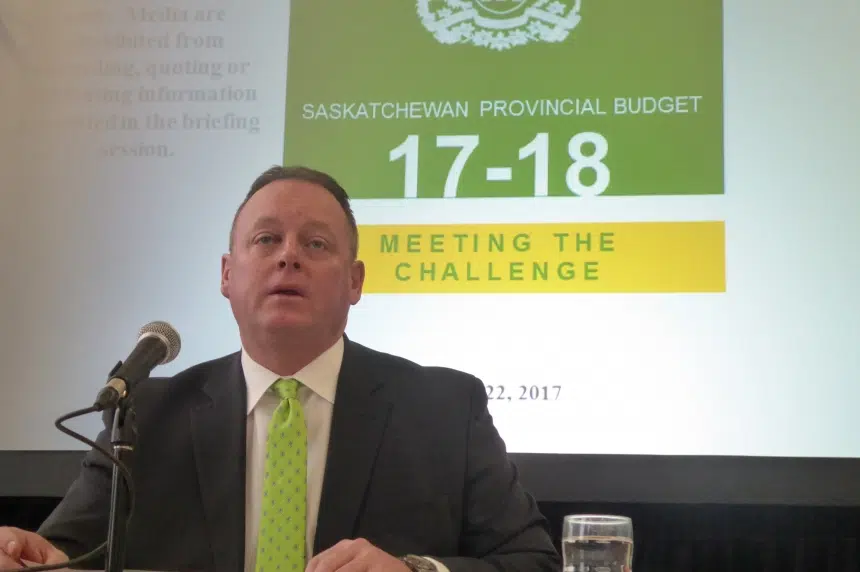The Saskatchewan government is raising the PST and scrapping the provincial bus company in an effort to reduce the deficit.
At midnight on March 23, the PST will increase one point – from five to six per cent.
As of April 1, the PST will also be expanded to apply to children’s clothing, snack foods and restaurant meals, renovation and repairs and permanently mounted equipment in the oil and gas sector. Insurance premiums will have PST effective July 1.
“We need the revenue, frankly,” Finance Minister Kevin Doherty said Wednesday. “I acknowledge it will put some pressure on families.”
The PST increase and expansion, factoring in tax credits and rebates, means an average family of four earning $75,000 will face a $442 increase in their household expenditure.
A single person on a $25,000 income with face $56 more a year.
On top of that, the education portion of property taxes will also go up.
Sin taxes are increasing with consumers paying 50 cents more for a pack of 25 cigarettes, 6.8 per cent more for beer, 6 per cent for coolers, 5.3 per cent for most wines and 4 per cent more for most spirits.
The government is also eliminating the fuel tax exemption on gasoline for farmers, personal income tax credits for education expenses and the employee’s tool tax credit.
All of that is expected to generate $900 million in revenue for the government this fiscal year.
To offset these changes, personal income and corporate taxes will drop one per cent within three years. However, indexation of personal income tax is suspended.
The 2017-18 budget puts the deficit by the end of the fiscal year at $1.288 billion.
If forecasts hold true, the deficit will be reduced to $685 million in 2017-18, $304 million projected for 2018-19 and a $15 million surplus by 2019-20.
The government is building in a contingency fund of $300 million to counter any fluctuations in revenue this fiscal year in the hopes of mitigating any unforeseen events.
But the deficit meant more borrowing, so coupled with General Revenue Fund and Crown debt, overall provincial debt is now $18 billion.
STC scrapped
The biggest headline-maker is the decision to get rid of STC, the province’s bus company.
The doors will be shut on freight delivery May 19 and passenger services cease May 31. The move leaves 224 people without work.
“They did great work on behalf of government the people of the province, but we have to make these tough decisions,” Doherty said.
Budget Breakdown
Total revenue is forecast at $14.17 billion with expenses at $14.80 billion.
Health, education and social services still get the bulk of the money, with the biggest increase seen in social services with a massive 9.1 per cent hike.
That money is for child and family services, disability programs and income assistance.
There are no changes being made to the 28 existing school divisions. But with more than one percent less being given to K-12 this year, the classroom might be impacted anyway.
“People overwhelmingly did not want it,” Doherty said.
“But can there be program reductions and some co-operation and consolidation amongst school divisions to save some money that does not affect the frontline classroom? We believe so. I alluded to some with respect to procurement and busing.”
Health also receives a small drop on spending of 0.7 per cent, but savings are being made with the elimination of the hearing aid plan, podiatry services, orthotics and sleep apnea.
Those services will still be available low-income recipients. Chiropractic services will no longer be covered at all.
“For us to be able to achieve a balanced budget over the course of three years, we have to find savings in those big three areas of government, health education and social services,” Doherty said.
Long-term care costs will go up for about half of residents, based on income, effective July 1. The maximum increase will be $630 a month.
Other changes
There are a number of other ways the government is either cutting spending or pulling in more money.
Some personal tax credits are being chopped, education and tuition expenses as well as the employee tool tax credit.
Cities and towns will get less money this year, because PST revenue is down overall. But they’ll also get $35 million less from SaskPower and SaskEnergy.
The province will take on the management of Wascana Centre Authority, moving it into the Provincial Capital Commission under the Ministry of Central Services.
It is hoped this will streamline operations and investments into the park.
Regional parks will get 50 per cent less: Meewasin Valley Authority funding is cut in half, there is less spending on infrastructure in provincial parks and the arts will see its money cut by five per cent.
The community rink program is being suspended for another year, which will impact many small towns in Saskatchewan.
Regional libraries will get less, while subsidies to the Saskatoon and Regina Public Libraries will vanish completely.











